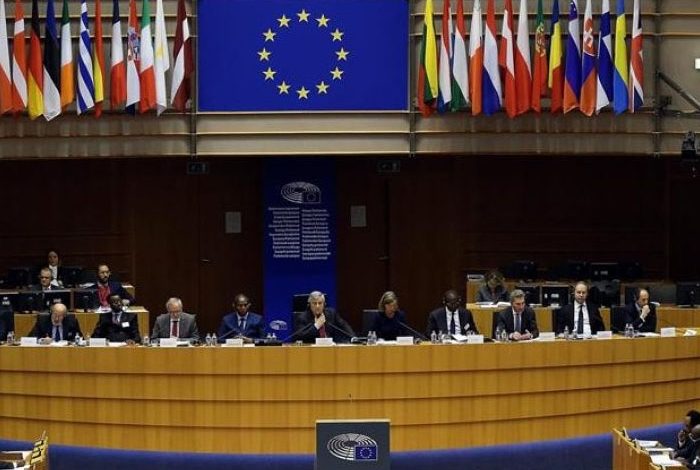The European Parliament Sparks Criticism in Lebanon – Details

The European Parliament has held Hezbollah and the Amal Movement responsible for exacerbating the presidential vacuum crisis in Lebanon by insisting on their candidate, the leader of the Marada Movement, Sleiman Frangieh. It called for the disarmament of the Iran-backed party and also decided to reject the forced deportation of Syrian refugees to their home country.
In a statement issued a few days ago, the European legislative body accused “illegally armed parties” of obstructing the democratic and constitutional process. It strongly condemned the attacks on United Nations peacekeeping forces (UNIFIL), calling for the accountability of those responsible as soon as possible, according to the German news agency.
The European Parliament approved a resolution calling on the European Council to impose sanctions on anyone obstructing the election of a new president and all parties hindering the investigation into the Beirut port explosion.
It urged the Lebanese Parliament to expedite the election of a new president and address the political, economic, social, and financial crises, as well as put an end to the institutional collapse.
Furthermore, it stressed the need to stop obstructing the investigation into the Beirut port explosion and called for the dispatch of an independent international mission to Beirut to uncover the truth about the tragic incident under the auspices of the United Nations and to hold those directly or indirectly responsible for the loss of lives and damage to the Lebanese people accountable.
The resolution also emphasized “the need to provide sufficient funding for agencies working with refugees to ensure basic services for refugees in the country,” noting that “the return of displaced persons should be voluntary, dignified, and safe according to international standards.”
The European Parliament’s decision this week, which includes keeping Syrian refugees in Lebanon and accusing the Lebanese state of encouraging the rise of hate speech against them, has elicited reactions in Lebanon, all of which unanimously condemn this decision and work to confront it, considering it as evidence of the West’s intentions to implement the resettlement project for refugees in Lebanon and impose it as a reality.
The Minister of Displaced Persons in the caretaker government, Esam Sharafeddine, condemned the European Union’s decision to continue supporting refugees on Lebanese territory, considering it “unfair, arbitrary, and politically motivated.” Sharafeddine pointed out that “the decision was not surprising, especially after a statement by a European official following a conference in Brussels that falls within the same context,” accusing European countries of “contradicting, evading, or even lying in this matter.”
For his part, Deputy Secretary-General of Hezbollah, Sheikh Naim Qassem, in his speech three days ago on the anniversary of the July war, stated, “The European Parliament has issued a decision that obliges Lebanon to keep Syrian refugees. Who is this parliament that wants to control our internal local decisions? Who is this parliament that prevents refugees from returning to their countries and imposes on us to accept them under difficult and complex conditions, while the Syrian regime accepts receiving them, knowing that they provide them with money in our country and encourage them not to return under the pretext of the security situation? Therefore, we say to them, stop providing money in this context and give money to those who voluntarily return, and then you will find that the majority of refugees want to return if their livelihood is secured there.”
Qassem concluded by calling on the government to take a bold step, form an official delegation, engage and meet with Syrian officials, develop a program, and impose restrictions in Lebanon to protect this society and the country, so that the Lebanese have their rights and the Syrians have their rights, and to help facilitate a safe and voluntary return coordinated with the Syrian state.












